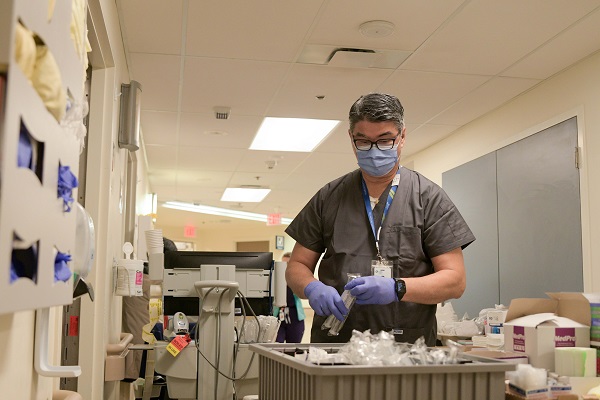In the ever-evolving landscape of health care, the emphasis on patient-centred care has become paramount. The role of support staff in clinical units has transformed significantly in recent years to better address the needs of patients and improve overall hospital efficiency. One remarkable shift at Oak Valley Health’s Markham Stouffville Hospital has been the transition of environmental services attendants (ESAs) to the newly created role of support services attendants (SSAs). The implementation of this new role and model of care has demonstrated impressive success, contributing to higher standards of care, improved patient experiences, and increased operational efficiency.
“Patient care is at the heart of almost every decision we make at the hospital,” said Maria Pavone, senior director, facilities & corporate services. “When we explored the idea of a revised model of care that enabled us to elevate the ESA role to have more direct patient interaction, we knew it would lead to positive impacts from both the quality of clinical care and the overall patient experience.”
The traditional role of the ESA primarily focused on housekeeping duties within clinical units, including tasks such as cleaning and disinfecting the physical environment. While these responsibilities were crucial to ensuring a clean and safe environment for patients to recover, free from the risk of hospital acquired infections (HAI), they often did not participate in direct patient care. The introduction of the SSA role sought to expand the scope of responsibilities to include additional clinical support functions in addition to their disinfecting responsibilities, creating additional capacity for the clinical teams to spend more time at the patient’s bedside.
The SSA role employs a new, enhanced model of care and standardized work that provides clinical staff, such as personal support assistants (PSAs) and nurses, with additional time to care for the patients at the bedside. This enhances the team-based model of care that allows clinical staff to successfully do their jobs by assigning the SSA with responsibilities that better support the clinical team in streamlining patient care.
SSAs are trained to collaborate closely with clinical staff. They assist clinical staff with internal bed moves, minimizing delays with cohorting patients while creating additional room vacancies for incoming admissions. SSA staff are also responsible for stocking bedside emergency kits, consumables on medication carts as well as replenishing unit-based PPE dispensers. This synergy between clinical and support staff has streamlined operations and improved patient throughput, resulting in reduced wait times and better resource allocation and as a result, increased time for patient care.
Given the heightened importance of infection control in health care, SSAs play a pivotal role in maintaining clean and germ-free environments. Their duties include routine cleaning and disinfecting of surfaces and equipment, ensuring that clinical units remain safe for patients and staff. Cleaning audits showed that on average, clinical units with SSAs had an eight per cent improvement, and over 90 per cent of patients surveyed agreed that their room and bathroom were kept clean during their stay.
“As a former ESA, the SSA role is a new experience where I get to learn more on the job, and have the ability to help the units with additional responsibilities,” says Manny Crisostomo, support services attendant, Oak Valley Health. “In this new role, I am more involved in the patient discharge care process, and I am also able to support some patient needs, such as getting them water or a blanket. I feel even more fulfilled now when I come to work.”
Clinical staff also have felt that since the SSA implementation, there has been improved capacity to perform clinical patient care, complete their standard of work for their daily tasks, and sufficient time to provide quality patient care at the right time.
To successfully execute their expanded roles, SSAs received comprehensive training and education, including learning about infection control, patient privacy, and safety protocols. This investment in training is a critical component of the program’s success.
The transformation from environmental services attendants to support services attendants reflects our honoured to care mission. The SSA role has not only enhanced the overall patient experience but also improved hospital efficiency.
The success of this transition has showcased the adaptability and innovation at Oak Valley Health in responding to the evolving needs of our patients. As the health care industry continues to evolve, the SSA model is a shining example of how progress and innovation can optimize and revolutionize patient care and experience for the better.
By Michelle Lee Hoy
Michelle Lee Hoy is a Senior Corporate Communications Specialist at Oak Valley Health.


